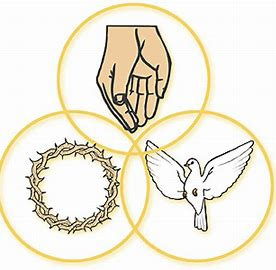Photo AI
Last Updated Sep 27, 2025
The Nature of God Simplified Revision Notes for GCSE OCR Religious Studies
Revision notes with simplified explanations to understand The Nature of God quickly and effectively.
292+ students studying
1.1.2 The Nature of God
The Trinity
Christians believe in one God who exists in three distinct 'persons': God the Father**,** God the Son (Jesus Christ), and God the Holy Spirit. These three persons form a unity known as the Trinity. The word "Trinity" is derived from 'tri', meaning 'three', and 'unity', meaning 'one'. This concept is fundamental to Christian theology and expresses the complex nature of one God in three persons.

Diagram of the Trinity.
Attributes of God
- Omnipotence refers to God being all-powerful. This is evidenced by the creation of the world as described in Genesis and the resurrection of Jesus Christ from the dead. These acts are seen as demonstrations of God's unlimited power.
- Omnibenevolence means that God is all-loving. This is expressed in many ways, notably through the sacrifice of Jesus Christ, God's own son, for the redemption of humanity. This act is viewed as the ultimate demonstration of God's unconditional love for all human beings without exception.
- Just describes God as fair and forgiving. Christians believe that God treats all individuals with fairness and justice. This is supported by biblical references, such as Psalm 25:8 which states, "God is fair and just". God's justice also involves forgiving those who repent and seek forgiveness for their actions.
- Omniscience signifies that God is all-knowing. Christians hold that God possesses complete knowledge of all things. This includes every person's inner thoughts, as well as knowledge of all past, present, and future events. This attribute reassures believers that God is aware of all circumstances and events.
- Transcendence means that God exists outside of and is not bound by worldly constraints and physical laws. For example, unlike humans, God does not live and die; He is eternal. This concept implies that a complete understanding of God is beyond human intellect, as His existence and nature transcend human experience and comprehension.
- Immanence reflects the belief that God is actively present in the world. This is demonstrated through historical interactions, such as God sending Jesus to Earth, and contemporary experiences, such as miracles and answered prayers. Many Christians believe that God continues to work in the world today, providing guidance and support to believers.

- Immanence reflects the belief that God is actively present in the world. This is demonstrated through historical interactions, such as God sending Jesus to Earth, and contemporary experiences, such as miracles and answered prayers. Many Christians believe that God continues to work in the world today, providing guidance and support to believers.
Immanence
The Problem of Evil
The existence of evil and suffering in the world presents a significant challenge for Christians. They question why such negativity exists if God is truly all-powerful, all-knowing, and all-loving. This dilemma is known as the problem of evil.
Solutions to the Problem of Evil
- One solution is the concept of free will. Christians believe that God gave humans free will, which means that although He exists, He does not interfere in the suffering humans experience as a result of their own choices or the consequences of the natural world. This view holds that human freedom is essential and that suffering is a result of human actions, not divine intervention.
- Another explanation is that experiencing bad things could be a test of faith. For example, in the Holy Bible, Job is tested on many occasions but maintains his faith in God and ultimately receives a reward. This story illustrates the belief that enduring suffering can strengthen faith and lead to divine rewards.
- Some Christians argue that humans need evil to appreciate good. According to this view, balance is essential, and the existence of evil allows people to recognise and value goodness. This perspective sees evil and suffering as necessary counterparts to goodness and joy.
- A further belief is that God is beyond human understanding. While humans may not comprehend the reasons for suffering, Christians trust that God is fair and that the good will be rewarded in Heaven. This approach suggests that human limitations prevent a full understanding of God's purposes, but faith assures believers of divine justice.
- Lastly, some Christians believe that experiencing bad things is part of God's plan, and that humans should respond positively. This perspective encourages believers to trust in God's greater plan and to find meaning and growth through their suffering, even if it is not immediately apparent.
Exam Practice:
"God cannot be loving because people suffer"
Some people would agree with this statement. Christians are taught of the omnipotence of God. This may lead to the belief that God cannot be loving as he has the power to stop suffering, but he chooses not to. The existence of hell may also be seen as a contradiction to an omnibenevolent God. Some people may argue why a loving God would create people just for them to suffer. There are so many horrible things that occur in this world such as rape and natural disasters which are never the victim's fault. If God was loving, these things would not happen.
On the other hand, many people would disagree with this statement. Through the story of Adam and Eve, Christians are taught the concept of free will. People can choose how they live their lives, if this leads to suffering then that is their fault. Furthermore, God himself experienced human suffering through Jesus when he died on the cross. John states that "God so loved the world that he gave his one and only son, that whoever believes in him shall not perish but have eternal life:" Christians see Jesus' suffering as the ultimate demonstration of God's love as God gave his Son for our sins.
Lastly, some may argue that we learn from suffering. In a world without consequences, suffering would likely be much worse. I disagree with this statement as I believe that Jesus' death alone is proof of God's loving nature. I believe that we as humans have been given free will and if we choose to live our lives as God wants us to, we will not suffer but will rather live an eternal life with God in heaven.
500K+ Students Use These Powerful Tools to Master The Nature of God For their GCSE Exams.
Enhance your understanding with flashcards, quizzes, and exams—designed to help you grasp key concepts, reinforce learning, and master any topic with confidence!
121 flashcards
Flashcards on The Nature of God
Revise key concepts with interactive flashcards.
Try Religious Studies Flashcards3 quizzes
Quizzes on The Nature of God
Test your knowledge with fun and engaging quizzes.
Try Religious Studies Quizzes18 questions
Exam questions on The Nature of God
Boost your confidence with real exam questions.
Try Religious Studies Questions7 exams created
Exam Builder on The Nature of God
Create custom exams across topics for better practice!
Try Religious Studies exam builder46 papers
Past Papers on The Nature of God
Practice past papers to reinforce exam experience.
Try Religious Studies Past PapersOther Revision Notes related to The Nature of God you should explore
Discover More Revision Notes Related to The Nature of God to Deepen Your Understanding and Improve Your Mastery
96%
114 rated
Christianity Key Beliefs: The Nature of God
Introduction to Christianity
333+ studying
181KViews